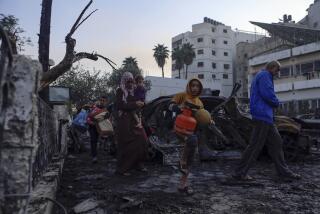Congo faces new dangers after munitions depot blasts
Reporting from Johannesburg, South Africa — Emergency workers struggled Monday to prevent fires from reaching a second munitions depot in the Republic of Congo’s capital the day after devastating blasts at another ammunition storage site killed more than 200 people.
The Mines Advisory Group, an international nongovernmental organization, warned that more people in Brazzaville were at risk of being killed in the coming days as munitions scattered by Sunday’s blasts explode.
The disaster underscored anew the dangerous practice in many developing countries of storing ordnance in heavily populated areas.
The death toll reached 213 on Monday, the Associated Press reported, as rescue workers continued to pull bodies from the rubble. An estimated 1,500 people were injured, many of them critically. Many were buried when a church collapsed on worshipers.
Government officials blamed faulty electrical wiring for Sunday’s explosions.
Congolese President Denis Sassou-Nguesso said the blasts were accidental. He visited two hospitals where many of the victims were taken.
“We will face this,” he said, according to news services. “We are trying to organize ourselves. I am asking the population to show courage and solidarity.”
Hardest hit was the neighborhood of Mpila, according to authorities, where many houses and buildings were flattened.
The Mines Advisory Group, which specializes in dealing with land mines and unexploded ordnance, was working with authorities to stem the crisis. The organization said Monday that the blasts scattered ammunition across the city and that it was continuing to explode, causing more fatalities.
“The location means that this explosion is devastating, involving a huge number of casualties and enormous damage to the area,” Lionel Cattaneo, an official for the group in Brazzaville, said in a statement. He added that it was crucial to work quickly to prevent more deaths.
“Educating people about the risks, and removing and destroying these deadly items, are of critical concern,” Cattaneo said. “We have the full support of the Republic of Congo government and have teams responding as a matter of urgency to help avoid further loss of life.”
According to a Small Arms Survey briefing paper in November, 210 people were killed last year in Africa by explosions at munitions depots. There were 35 explosions worldwide, the most serious a blast last March in Yemen that killed 150.
From 1998 to October 2011 there were 38 such incidents in Africa, 57 in Eastern Europe and 138 in Asia.
The problem is exacerbated when huge munitions depots are located in crowded urban settings, which occurs particularly in African and Asian cities. An incident in 2002 in Lagos, Nigeria, killed more than 1,100 people.
“The suffering and damage caused by these incidents underlines the importance of storing munitions safely and also the importance of providing states with the technical support that can enable them to do so,” Nick Roseveare, chief executive of the mines group, said in a statement. “It’s far easier to avoid these incidents than to deal with the deadly fallout.”
More to Read
Sign up for Essential California
The most important California stories and recommendations in your inbox every morning.
You may occasionally receive promotional content from the Los Angeles Times.









